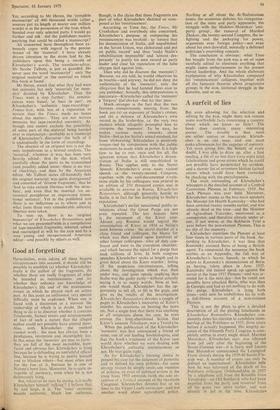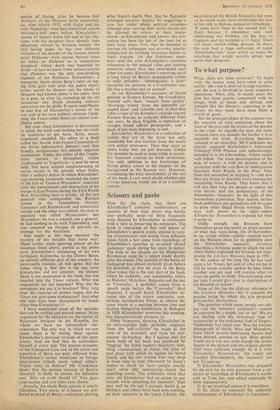A surfeit of lies
But even allowing for the selection and editing by the KGB, might there not remain some worthwhile facts concerning a country about which we know so little? The book does contain many interesting stories : The trouble is that most are either untrue or inaccurate. Khrush- chev is an old man, and one must make allowances for the vagaries of memory. Yet even giving 'him the benefit of every doubt, I was able to draw up, after a first reading, a list of no less than forty-eight total falsifications and gross errors which he could not possibly have perpetrated by accident, and a shorter list of seventeen blatant factual errors which could have been corrected by checking with the encyclopaedia.
The most astounding of Khrushchev's whoppers is the detailed account of a Central Committee Plenum in February 1939. No such Plenum was ever held. Moreover, Khrushchev names as the two main speakers the Minister for Health Kaminsky—who had been arrested twenty months earlier, and was already dead at the time—and the Minister of Agriculture Yakovlev, mentioned as a conspirator, and therefore already under ar- rest, if not worse, at the Bukharin Trial a year before the non-existent Plenum. This is no slip of the memory.
Khrushchev mentions the Plenum at least four times in various parts of the book. Ac- cording to Khrushchev, it was then that Kaminsky accused Beria of being a British agent. To compound the nonsense the book carries, as an Appendix, the full text of Khrushchev's Secret Speech, in which he refers to Kaminsky's denunciation of Beria as having taken place in June 1937. Kaminsky did indeed speak up against the terror at the June 1937 Plenum—and was ar- rested for it the next day—but he could not possibly have attacked Beria, who was then in Georgia and had as yet nothing to do with the purge. Khrushchev is lying both times—only now he embellishes his lie with a full-blown account of a non-existent Plenum.
This is not the place to give a detailed description of all the glaring falsehoods in Khrushchev Remembers. Khrushchev con- sistently dates his election to candidate mem- bership of the Politburo as 1935, three years before it actually happened. His lengthy ac- count of the fifteenth Party Congress is com- pletely untrue in every single detail. Marshal Meretskov, Khrushchev says, was released from jail only after the beginning of the Soviet-German war—it is fairly well known that Meretskov commanded the Leningrad Front already during the 1939-40 Soviet-Fin- nish war. A number of events can only he defined as supernatural : Khrushchev tells how he was informed of the death of his Politburo colleague Ordzhonikidze in 1937 by a telephone call from the Kremlin from Yenukidze--an Old Bolshevik who had been expelled from the party and removed from all his posts two years earlier, and was already in jail at the time. Khrushchev speaks of dining, after he became first secretary of the Moscow party committee, i.e. after March 1935, with Stalin and his wife Nadezhda—who had committed suicide two-and-a-half years before. K hrushchev's stories of Stalin's home life and of his rela- tions with his daughter have already been effectively refuted by Svetlana herself. On two facing pages he has two different versions of the murder of the famous Jewish actor Mikhoels—both untrue, Several times he refers to Zhdanov as a compulsive drunkard, whose death was hastened by drink—in fact we know from various sources that Zhdanov was the only non-drinking member of the Politburo. Khrushchev, it transpires, learnt about Beria's habit of rap- ing little girls only after the police chief's arrest, purely by chance—yet the whole of Moscow had known about it for years. And so it goes, lie after lie, including all the old favourites like Stalin planning military operations on the globe. It seems superfluous to add that all Khrushchev's stories of the war and of his own military prowess ('grip- ping' the Times called them) are almost corn- pletely untrue.
But even when Khrushchev is determined to speak the truth and nothing but the truth he contrives to get facts, dates, names hopelessly muddled. He refers to a body called the 'Jewish Anti-Fascist Committee of the Soviet Information Bureau'—and thus handily amalgamates two entirely separate institutions. Yudin, the editor of the Comin- form journal, is throughout called Ambassador to Yugoslavia—a post he never held, The most tangled conglomeration of errors occurs in the episode when Stalin, after a military defeat in which Khrushchev was involved, ominously reminded the latter of the fate of 'General Myasnikov', executed after the encirclement and destruction of his troops in East Prussia during the First World War. Everything here is wrong: of the two generals who commanded the Russian armies in the Tannenberg disaster, Samsonov and Rennenkamf, one committed suicide and the other was retired; the man in question was called Myasoyedov, not Myasnikov; he was a colonel, not a general; he had nothing to do with Tannenberg, and was executed on charges of pre-war es-, pionage for the Austrians.
One might at this stage mention 'the mystery of the mistake that never was'. Many critics, while ignoring almost all the instances listed above, quoted as the prime error Khrushchev's misplacing of his own birthplace, Kalinovka, to the Donetz Basin, an entirely different part of the country. An inexcusable mistake, all will agree. But the funny thing is that this is the one error Khrushchev did not commit: the Donetz Basin is not mentioned in the book, but was inserted into the Times version. Who was
responsible for the insertion? Why did the
newspaper not put it in brackets? Why, long after the clamour of protest began, did the Times not give some explanation? And what else may have been interpolated by hands
other than K hrushchev's?
I have mentioned some of the episodes that can be verified and proved untrue. More important for the historian are the stories of Byzantine intrigues in the Kremlin, for which we have no independent cor- roboration. The only way in which we can check them is by setting them against 'Khrushchev's previous versions of the same events. And we find that he contradicts himself at every step. The present accounts of the Leningrad Case and of the arrest and execution of Beria are quite different from Khrushchev's earlier renditions to foreign interviewers (which never tallied either).
Which story to believe? Mr Crankshaw thinks that the present account of Beria's downfall 'is likely to remain the definitive one'. Why on earth should it? You pays your money and you takes your choice.
Actually, the whole Beria episode is utterly ridiculous. Two pieces of evidence are pro-, duced as proof of Beria's underhand plotting after Stalin's death. One, that he flagrantly infringed socialist legality by suggesting a new law under which political prisoners released after serving their terms should not be allowed to return to their home- towns—as Khrushchev well knows, this pro- cedure has been the law of the land for at least forty years. Two, that he intended to corrupt his colleagues and provoke popular indignation by building luxurious dachas at State expense for the Politburo mem- bers—and this after Khrushchev's countless references to the palatial villas and hunting preserves where they had entertained each other for years. Khrushchev's summing-up of a long litany of Beria's unspeakable crimes is truly priceless: 'Ideologically, I didn't recognise his position as a Communist one. He was a butcher and an assassin'.
As for Khrushchev's accounts of Soviet policies in Eastern Europe, Mr Crankshaw himself calls them 'remote from reality', 'diverging widely from the generally ac- cepted facts', and valuable only in that they 'offer a view of the Kremlin's attitude toward Eastern Europe so radically different from our own'. In plain English, a repetition of straight Soviet official propaganda, and a pack of lies from beginning to end.
Khrushchev Remembers is a collection of stories that are in the main not only unreliable but also familiar from the man's own earlier utterances. Then they came as news, today they are just tiresome. Unlike the speeches he used to make while in power, his 'memoirs' contain no fresh revelations. The only addition to our knowledge of Soviet policy comes in the chapter on the background to the Korean war. However, considering the total unreliability of the rest of the book, I very much doubt whether any s-rious historian would use it as a credible source.











































 Previous page
Previous page